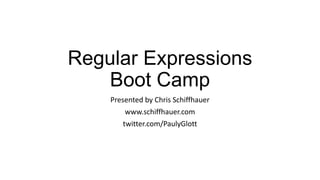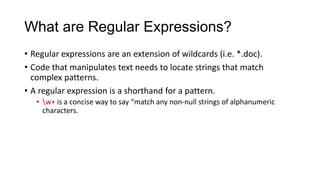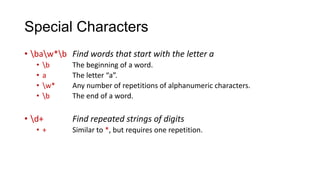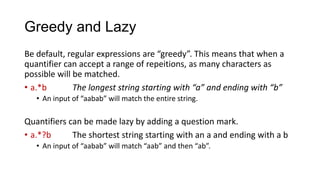Regular Expressions Boot Camp
- 1. Regular Expressions Boot Camp Presented by Chris Schiffhauer www.schiffhauer.com twitter.com/PaulyGlott
- 2. What are Regular Expressions? ŌĆó Regular expressions are an extension of wildcards (i.e. *.doc). ŌĆó Code that manipulates text needs to locate strings that match complex patterns. ŌĆó A regular expression is a shorthand for a pattern. ŌĆó w+ is a concise way to say ŌĆ£match any non-null strings of alphanumeric characters.
- 3. Finding Nemo ŌĆó nemo Find nemo ŌĆó When ignoring case, will match ŌĆ£NemoŌĆØ, ŌĆ£NEMOŌĆØ, or ŌĆ£nEmOŌĆØ. ŌĆó Will also match characters 9-12 of ŌĆ£Johnny MnemonicŌĆØ, or ŌĆ£Finding Nemo 2ŌĆØ. ŌĆó bnemob Find nemo as a whole word ŌĆó b is a code that says ŌĆ£match the position at the beginning of end of any wordŌĆØ. ŌĆó Will only match complete words spelled ŌĆ£nemoŌĆØ with any combination of upper and lowercase letters. ŌĆó bnemob.*b2b Find text with ŌĆ£nemoŌĆØ followed by ŌĆ£2ŌĆØ ŌĆó The special characters that give Regular Expressions their power is already making them hard for humans to read.
- 4. Determining the Validity of Phone Numbers ŌĆó bddd-ddd-dddd ŌĆó d ŌĆó- Matches any single digit. Literal hyphen (has no special meaning). ŌĆó bd{3}-d{3}-d{4} ŌĆó {3} Find ten-digit US phone number Better way to find the number Follows d to mean ŌĆ£repeat the preceding character three timesŌĆØ.
- 5. Special Characters ŌĆó baw*b Find words that start with the letter a ŌĆó ŌĆó ŌĆó ŌĆó b a w* b ŌĆó d+ ŌĆó+ The beginning of a word. The letter ŌĆ£aŌĆØ. Any number of repetitions of alphanumeric characters. The end of a word. Find repeated strings of digits Similar to *, but requires one repetition.
- 6. Special Characters, continued ŌĆó bw{6}b Find six letter words ŌĆó ŌĆó ŌĆó ŌĆó ŌĆó ŌĆó ŌĆó . w s d b ^ $ Match any character except newline Match any alphanumeric character Match any whitespace character Match any digit Match the beginning or end of a word Match the beginning of the string Match the end of the string
- 7. Beginnings and Endings ŌĆó ^d{3}-d{3}-d{4}$ Validate an entire string as a phone number ŌĆó^ The beginning of the string. ŌĆó$ The end of the string. ŌĆó In .NET, use RegexOptions.Multiline to match the beginning and end of a line. ŌĆó ^$1000$ ŌĆó ŌĆó ŌĆó ŌĆó ^ $ 1000 $ Find ŌĆ£$1000ŌĆØ as the entire string The beginning of the string. Escaped ŌĆ£$ŌĆØ (literal ŌĆ£$ŌĆØ). Literal ŌĆ£1000ŌĆØ. The end of the string.
- 8. Wash, Rinse, Repeat ŌĆó* ŌĆó+ ŌĆó? ŌĆó {n} ŌĆó {n,m} ŌĆó {n,} Repeat any number of times Repeat one or more times Repeat zero or one time Repeat n times Repeat at least n, but not more than m times Repeat at least n times.
- 9. Wash, Rinse, Repeat, continued ŌĆó bw{5,6}b ŌĆó w{5,6} Find all five and six letter words Word with at least 5, but not more than 6, characters. ŌĆó b+d{1,3}sd{3}-d{3}-d{4} Find phone numbers formatted for intŌĆÖl calling ŌĆó s White space ŌĆó d{3}-d{2}-d{4} Find social security numbers ŌĆó ^w* Find first word in string
- 10. Character Classes ŌĆó [aeiou] Matches any vowel ŌĆó [.?!] Matches punctuation at the end of a sentence ŌĆó. ŌĆó? Literal ŌĆ£.ŌĆØ, losing its special meaning because itŌĆÖs inside brackets Literal ŌĆ£?ŌĆØ ŌĆó (?d{3}[) ]s?d{3}[ ]d{4} Matches a 10-digit phone number ŌĆó (? Zero or one left parentheses. ŌĆó [) ] A right parenthesis or a space. ŌĆó Will also match ŌĆ£480) 555-1212ŌĆØ.
- 11. Negation ŌĆó W ŌĆó S ŌĆó D ŌĆó B ŌĆó [^x] ŌĆó [^aeiou] Match any character that is NOT alphanumeric Match any character that is NOT whitespace Match any character that is NOT a digit Match a position that is NOT a word boundary Match any character that is NOT ŌĆ£xŌĆØ Match any character that is NOT one of the chars ŌĆ£aeiouŌĆØ ŌĆó S+ All strings that do not contain whitespace characters
- 12. Alternatives ŌĆó| Pipe symbol separates alternatives ŌĆó bd{5}-d{4}b|bd{5}b Five and nine digit Zip Codes ŌĆó bd{5}-d{4}b Leftmost alternative first: nine digit Zip Codes. ŌĆó bd{5}b Second: five digit Zip Codes. ŌĆó bd{5}b|bd{5}-d{4}b Only matches five digit Zip Codes ŌĆó ((d{3})|d{3})s?d{3}[- ]d{4} ŌĆó ((d{3})|d{3}) Ten digit phone numbers Matches ŌĆ£(480)ŌĆØ or ŌĆ£480ŌĆØ.
- 13. Grouping Parentheses delimit a subexpression to allow repetition or special treatment. ŌĆó (d{1,3}.){3}d{1,3} A simple IP address finder ŌĆó (d{1,3}.) A one to three digit number following by a literal period. ŌĆó {3} Repeats the preceding three times. ŌĆó Also matches invalid IP addresses like ŌĆ£999.999.999.999ŌĆØ. ŌĆó ((2[0-4]d|25[0-5]|[01]?dd?).){3}(2[0-4]d|25[0-5]|[01]?dd?) A better IP address finder
- 14. Backreferences Backreferences search for a recurrence of previously matched text that has been captured by a group. ŌĆó b(w+)bs*1b ŌĆó (w+) ŌĆó s* ŌĆó 1 Find repeated words Finds a string of at least one character within group 1. Finds any amount of whitespace. Finds a repetition of the captured text.
- 15. Backreferences, continued Automatic numbering of groups can be overridden by specifying an explicit name or number. ŌĆó b(?<Word>w+)bs*k<Word>b Capture repeated word in a named group ŌĆó (?<Word>w+) Names this capture group ŌĆ£WordŌĆØ.
- 16. Captures and Lookarounds ŌĆó Captures ŌĆó (exp) Match ŌĆ£expŌĆØ & capture in an automatically numbered group. ŌĆó (?<name>exp) Match ŌĆ£expŌĆØ and capture it in a group named name. ŌĆó (?:exp) Match ŌĆ£expŌĆØ, but do not capture it. ŌĆó Lookarounds text ŌĆó ŌĆó ŌĆó ŌĆó (?=exp) (?<exp) (?!exp) (?<!exp) Match a position like ^ or b and never match any Match any position preceding a suffix ŌĆ£expŌĆØ. Match any position following a prefix ŌĆ£expŌĆØ. Match any position after which the suffix ŌĆ£expŌĆØ isnŌĆÖt found. Match any position before which the prefix ŌĆ£expŌĆØ isnŌĆÖt found.
- 17. Positive Lookaround ŌĆó bw+(?=ingb) ŌĆó (?=ing) The beginning of words ending with ŌĆ£ingŌĆØ ŌĆ£Zero-width positive lookahead assertionŌĆØ Matches a position that precedes a given suffix. ŌĆó (?<=bre)w+b The end of words starting with ŌĆ£reŌĆØ ŌĆó (?<=bre) ŌĆ£Zero-width positive lookbehind assertionŌĆØ Matches a position following a prefix. ŌĆó (?<=d)d{3}b 3 digits at the end of a word, preceded by a digit ŌĆó (?<=s)w+(?=s) Alphanumeric strings bounded by whitespace
- 18. Negative Lookaround ŌĆó bw*q[^u]w*b ŌĆó [^u] Always matches a character. ŌĆ£IraqŌĆØ does not match. ŌĆó bw*q(?!u)w*b ŌĆó (?!u) Words with ŌĆ£qŌĆØ followed by NOT ŌĆ£uŌĆØ Search for words with ŌĆ£qŌĆØ not followed by ŌĆ£uŌĆØ ŌĆ£Zero-width negative lookahead assertionŌĆØ Succeeds when ŌĆ£uŌĆØ does not exist. ŌĆ£IraqŌĆØ matches. ŌĆó (?<![a-z ])w{7} 7 alphanumerics not preceded by a letter or space ŌĆó (?<![a-z ]) ŌĆ£Zero-width negative lookbehind assertionŌĆØ
- 19. Greedy and Lazy Be default, regular expressions are ŌĆ£greedyŌĆØ. This means that when a quantifier can accept a range of repeitions, as many characters as possible will be matched. ŌĆó a.*b The longest string starting with ŌĆ£aŌĆØ and ending with ŌĆ£bŌĆØ ŌĆó An input of ŌĆ£aababŌĆØ will match the entire string. Quantifiers can be made lazy by adding a question mark. ŌĆó a.*?b The shortest string starting with an a and ending with a b ŌĆó An input of ŌĆ£aababŌĆØ will match ŌĆ£aabŌĆØ and then ŌĆ£abŌĆØ.
- 20. Greedy and Lazy, continued ŌĆó *? ŌĆó +? ŌĆó ?? ŌĆó {n,m}? ŌĆó {n,}? Repeat any number of times, but as few as possible. Repeat one or more times, but as few as possible. Repeat zero or one time, but as few as possible. Repeat at least n, but no more than m, as few as possible. Repeat at least n times, but as few as possible.










![Character Classes
ŌĆó [aeiou]
Matches any vowel
ŌĆó [.?!]
Matches punctuation at the end of a sentence
ŌĆó.
ŌĆó?
Literal ŌĆ£.ŌĆØ, losing its special meaning because itŌĆÖs inside brackets
Literal ŌĆ£?ŌĆØ
ŌĆó (?d{3}[) ]s?d{3}[ ]d{4}
Matches a 10-digit phone number
ŌĆó (?
Zero or one left parentheses.
ŌĆó [) ]
A right parenthesis or a space.
ŌĆó Will also match ŌĆ£480) 555-1212ŌĆØ.](https://image.slidesharecdn.com/regularexpressionsbootcamp-131109132413-phpapp02/85/Regular-Expressions-Boot-Camp-10-320.jpg)
![Negation
ŌĆó W
ŌĆó S
ŌĆó D
ŌĆó B
ŌĆó [^x]
ŌĆó [^aeiou]
Match any character that is NOT alphanumeric
Match any character that is NOT whitespace
Match any character that is NOT a digit
Match a position that is NOT a word boundary
Match any character that is NOT ŌĆ£xŌĆØ
Match any character that is NOT one of the chars ŌĆ£aeiouŌĆØ
ŌĆó S+
All strings that do not contain whitespace characters](https://image.slidesharecdn.com/regularexpressionsbootcamp-131109132413-phpapp02/85/Regular-Expressions-Boot-Camp-11-320.jpg)
![Alternatives
ŌĆó|
Pipe symbol separates alternatives
ŌĆó bd{5}-d{4}b|bd{5}b
Five and nine digit Zip Codes
ŌĆó bd{5}-d{4}b Leftmost alternative first: nine digit Zip Codes.
ŌĆó bd{5}b
Second: five digit Zip Codes.
ŌĆó bd{5}b|bd{5}-d{4}b
Only matches five digit Zip Codes
ŌĆó ((d{3})|d{3})s?d{3}[- ]d{4}
ŌĆó ((d{3})|d{3})
Ten digit phone numbers
Matches ŌĆ£(480)ŌĆØ or ŌĆ£480ŌĆØ.](https://image.slidesharecdn.com/regularexpressionsbootcamp-131109132413-phpapp02/85/Regular-Expressions-Boot-Camp-12-320.jpg)
![Grouping
Parentheses delimit a subexpression to allow repetition or special
treatment.
ŌĆó (d{1,3}.){3}d{1,3}
A simple IP address finder
ŌĆó (d{1,3}.)
A one to three digit number following by a literal period.
ŌĆó {3}
Repeats the preceding three times.
ŌĆó Also matches invalid IP addresses like ŌĆ£999.999.999.999ŌĆØ.
ŌĆó ((2[0-4]d|25[0-5]|[01]?dd?).){3}(2[0-4]d|25[0-5]|[01]?dd?)
A better IP address finder](https://image.slidesharecdn.com/regularexpressionsbootcamp-131109132413-phpapp02/85/Regular-Expressions-Boot-Camp-13-320.jpg)




![Negative Lookaround
ŌĆó bw*q[^u]w*b
ŌĆó [^u]
Always matches a character. ŌĆ£IraqŌĆØ does not match.
ŌĆó bw*q(?!u)w*b
ŌĆó (?!u)
Words with ŌĆ£qŌĆØ followed by NOT ŌĆ£uŌĆØ
Search for words with ŌĆ£qŌĆØ not followed by ŌĆ£uŌĆØ
ŌĆ£Zero-width negative lookahead assertionŌĆØ
Succeeds when ŌĆ£uŌĆØ does not exist. ŌĆ£IraqŌĆØ matches.
ŌĆó (?<![a-z ])w{7} 7 alphanumerics not preceded by a letter or space
ŌĆó (?<![a-z ])
ŌĆ£Zero-width negative lookbehind assertionŌĆØ](https://image.slidesharecdn.com/regularexpressionsbootcamp-131109132413-phpapp02/85/Regular-Expressions-Boot-Camp-18-320.jpg)

